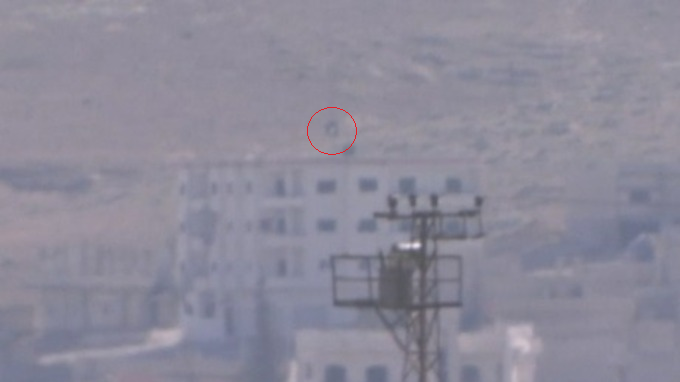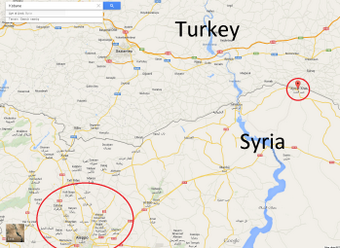2,000
evacuated as ISIS flag raised on outskirts of Kobani, Syria
RT,
6
October, 2014
The
black Islamic State flag has been raised over a building on the
outskirts of a strategic town of Kobani on the Syrian-Kurdish border,
according to various sources. However, Kurds defending the border
town say that the city has not yet fallen.
Attacks
in the town intensified on Sunay when Islamic State (IS, formerly
ISIS or ISIL) militants besieged the city.
The
black flag was seen at the top of a four story building, according to
the images shot from Turkey. A Turkish military officer who preferred
to remain anonymous confirmed to Reuters that the flag had been that
of the Islamists.
Fighting
kicked off east of Kobani (Ayn al-Arab in Arabic), the northern
Syrian town facing a fierce onslaught of Islamic State (IS) on
Sunday. However, an initial offensive was launched some two weeks
ago. The jihadist group had earlier pledged to overrun the town by
the beginning of Eid al-Adha, or Feast of Sacrifice.
Shortly
after news of the flag's planting emerged, a member of the Kurdish
Democratic Union Party (PYD) announced that more than 2,000 people
were being evacuated as IS advanced, reported Reuters. Over 186,000
Kurds have already fled to Turkey from the city.
"We
can hear the sound of clashes in the street," a
translator, Parwer Ali Mohamed, said over the phone as the group made
its way to Turkey.
An
official in Kobani has told the BBC that the entire city may fall to
Islamic militants “soon.” The official, Idriss Nassan, said the
IS was now in control of Mistenur – a hill of strategic importance
– in the east of the city.
“Yes,
it will certainly fall soon,” he said.
However,
Reuters’ sources have been dismissive.
“ISIL
have only planted a flag on one building on the eastern side of
town,” Ismail Eskin, a journalist in the town told Reuters. “That
is not inside the city, it's on the eastern side. They are not inside
the city. Intense clashes are continuing.”
Pawer
Mohammed Ali, a translator for the PYD inside Kobani also told the
news agency that there was active resistance from the Kurdish forces.
“During
the day sometimes IS makes advances, but YPG pushes them back. There
are clashes within the vicinity, but they are not inside the city,
YPG is resisting,” Ali said.
On
Sunday night, a Kurdish female suicide bomber detonated herself with
a grenade in the struggle against the IS in the town. The woman was
identified as Arin Mirkan, a commander in the Kurdish People’s
Protection Unit, and the instance marks the first of a female suicide
attack.
Some
20 IS jihadists have been killed trying to enter Kobani, AFP cited a
monitor as saying on Monday.
Syrian
Kurds have been echoing the warnings of a British military official
recently who stated that ground troops are necessary in the struggle
against the IS.
“Airstrikes
alone are really not enough to defeat ISIS in Kobani,” Idris
Nassan, a senior spokesman for the Kurdish fighters, told the
Guardian on Monday. “They are besieging the city on three sides,
and fighter jets simply cannot hit each and every ISIS fighter on the
ground.”
Turkish
press reported hearing explosions from the other side of the border
early Sunday, with a mortar round from the conflict landing inside
Turkey’s border.
The
situation in Kobani has been getting increasingly desperate. The
fighting has already prompted some 186,000 Kurds to flee the area
across the border into Turkey, and groups of Kurdish volunteers
wishing to cross into Syria to defend the town against IS on Saturday
clashed with tear gas-firing Turkish security forces refusing to let
them pass.
Around
100,000 people are still staying in Kobani amid the violence,
according to TASS.
NATO
promises to protect
Turkey against ISIS threat
Turkey against ISIS threat
RT,
8
October, 2014
NATO
will not abandon Turkey if it is attacked by Islamic State fighters
which are closing in on the member state's border from Syria, the
alliance's secretary-general, Jens Stoltenberg, said.
“Turkey
should know that NATO will be there if there is any spillover, any
attacks on Turkey as a consequence of the violence we see in Syria,”
Stoltenberg
said, as quoted by Reuters.
On Monday, Islamic State (IS,
formerly ISIS/ISIL) militants raised their black flag on the eastern
outskirts of the Syrian town of Kobani (Ayn al-Arab), which is
situated near the Turkish border.
The secretary-general
stressed that NATO's main task is to “protect all allied
countries,” including Turkey, which joined the alliance in 1952.
“Turkey
is a NATO ally and our main responsibility is to protect the
integrity, the borders of Turkey and that is the reason why we have
deployed Patriot missiles in Turkey to enhance, to strengthen the
airfence of Turkey," Stoltenberg said during a visit to Poland.
NATO
Secretary-General Jens Stoltenberg (Reuters)
Six
Patriot missile batteries were delivered to Turkey in early 2013
after Ankara asked for NATO's help to bolster security along its
900-kilometer border with war-torn Syria.
Last week, Turkey's
parliament authorized the presence of foreign forces on the country’s
territory.
The mandate came after Washington put pressure on Ankara
to allow troops to use Incirlik air base in the southern Adana
region.
MPs also gave the Turkish military the go-ahead to
engage in military action against Islamic State insurgents in Syria
and Iraq.
Previously, Turkish President Recep Tayyip Erdogan
said that the “Turkish military alone” would be able to protect
the country’s borders from ISIS jihadists.
Turkey
possesses the strongest army in the region, with over 400,000
activepersonnel, more than 3,500 tanks, and nearly 1,000 aircrafts,
according to Global Firepower website.
In April, Business Insider
included the country’s army in its list of the “11 most powerful
militaries in the world.” It ranked eighth, ahead of South Korea,
Japan, and Israel.
“Turkish military spending is expected to
rise 9.4 percent in 2014 over the 2013 budget.
The ongoing conflict
in Syria and possible clashes with the Kurdish separatist
organization, the PKK, were key reasons for the spending increase.
Turkey's defense budget stands at $18.2 billion,” Business Insider
said.
“The NATO member has contributed soldiers to various
initiatives around the world. The Turkish military took part in
operations in Afghanistan, as well as in peacekeeping operations in
the Balkans. Turkey also maintains a large military force in Northern
Cyprus,” the publication added.
The violent Islamic Sate
jihadist group continues to gain territory, despite airstrikes
performed against it in Syria and Iraq by the US-led coalition.
Jihadist
Trojan: Fears ISIS extremists sneak into Europe with refugees
U.S.
intelligence warns that the ISIS is planning to disguise its
combatants as refugees - and send them to Europe to launch attacks.






No comments:
Post a Comment
Note: only a member of this blog may post a comment.